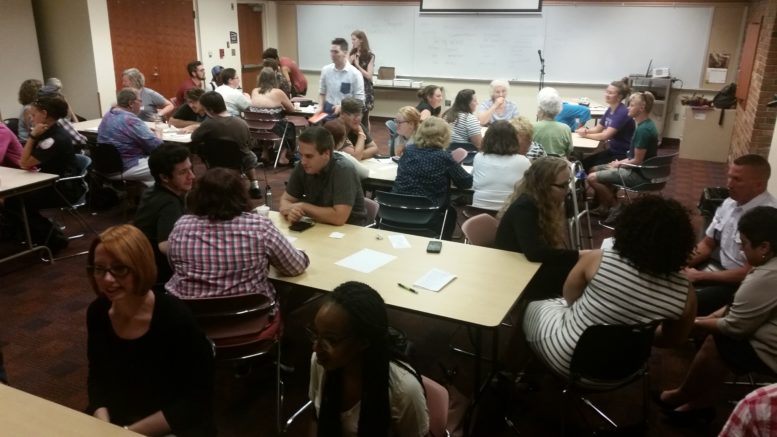By JAN LARSON McLAUGHLIN
BG Independent News
Crowding around the tables at the library Thursday were people of white privilege, people of color, and people who love who they choose to.
At one table in the back of the room were four people of different backgrounds with one common link – discomfort and discrimination in Bowling Green.
Ayanna Byers, a BGSU graduate student from Pittsburgh, had been in the city for less than three weeks. Longtime Bowling Green residents were telling her about a nearby community, when Byers asked if it was a “sundown town.”
The white women at the table didn’t understand, until Byers explained. “It’s a town where if you’re a person of color you shouldn’t be there after sundown.”
As a black woman, Byers said she is accustomed to being followed around stores by shop employees. “I’m so used to things happening,” she said, so sometimes she doesn’t even realize it at first.
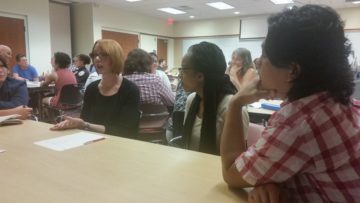
Erin Hachtel, Ayanna Byers and Krishna Han talk.
She has only ventured off campus twice since arriving in the city, the first time to an ice cream shop. She was standing at the counter to order, when a white woman and her children pushed in front of her.
“It still happens,” Byers said.
Sometimes it’s subtle, and impossible to prove.
“But you feel it in your gut,” said another person at the table, Krishna Han, who is from Cambodia.
“I never knew racism till I came to this country,” said Han, whose skin is brown and who speaks English as his third language. Han said Bowling Green is much more inclusive than a lot of small American cities, but there is room for improvement.
At the other end of the table was a white lesbian couple, who told of a less than welcoming experience when they moved to Bowling Green last year. The couple said a neighbor left notes with the words “Dike” and “Lesbo” for them, and tried to injure their dog by putting rat poison in their backyard.
The couple, Jacqueline Adams and Kacey Long, reported the threats. They ended up moving to a different home during their first semester in the city – and found a very supportive landlord and neighborhood.
“Sometimes you get that one rotten neighbor,” Adams said. “We don’t let one person define how we feel about everyone.”
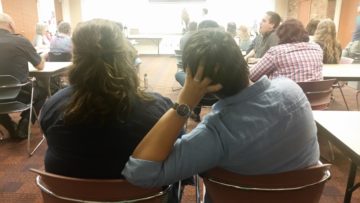
Jacqueline Adams and Kacey Long listen during meeting.
Those four were among about 60 people who gathered Thursday to discuss diversity and inclusion in the city. They came from different places – some activists, some retired, some teachers, some police officers, some students, and some city council members. All were seeking the concepts of inclusion, mutual respect, safety, justice, acceptance and equity.
While Bowling Green has made strides as a community to make people feel welcome, there is more work to be done, according to organizers of the meeting, Eli Johnson and Grace Easterly, interns for city council member Daniel Gordon.
“Bowling Green is a very slow moving place,” Johnson said, suggesting that this group may want to give the community a nudge.
Some positives were noted about the city, such as the Not In Our Town organization, the performance of the Bowling Green Police Division, and the response to concerns by BGSU administration.
But there is room to grow. One woman pointed out informational flyers put out by some local groups that never include photographs of people of color. Another mentioned the lack of community involvement with international students and the lost opportunity for interaction.
And someone who moved to Bowling Green from a southern state remarked on the number of confederate flags. “We’ve seen more confederate flags here.”
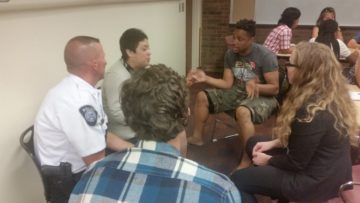
Police Chief Deputy Justin White, Leslie Galan and Julian Mack discuss topics.
Julian Mack, who went to school at BGSU, suggested that progress can only be made if people challenge their beliefs.
“You need to challenge your biases each day,” whether those biases are rooted in race, religion, gender or sexual orientation, Mack said. “You can’t wait till someone brings that to you. It’s not up to the oppressed to educate the privileged.”
Ana Brown suggested it was conversations like those that took place Thursday that allow progress to be made. “The greatest learning comes when you are in a place of discomfort.”
One woman put herself in that uncomfortable position at the meeting by taking a seat next to a BGSU police officer. Beatrice Addis Fields, a young black gay woman, sat next to BGSU officer Mike Campbell and decided, “we’re going to talk about it.”
“As a white male, I have no idea what you feel like,” Campbell said to Fields. But he also shared that he knows a little bit about what it feels like to be treated differently when he is wearing his uniform.
“We found common ground,” Fields said. “If we can, it’s possible anywhere.”
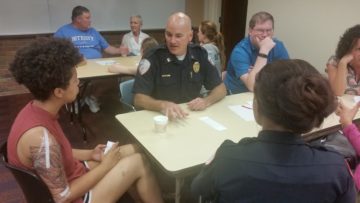
Beatrice Addis Fields talks with BGSU officer Mike Campbell.

